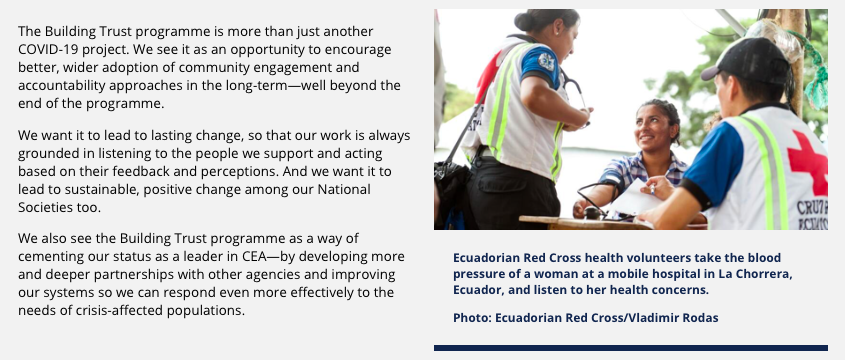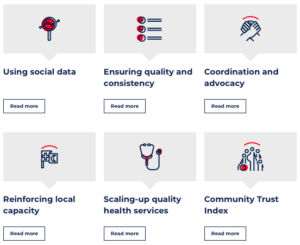Trust is essential for NGOs to do effective work serving individuals around the world. Organisations must establish relationships with communities and individuals that demonstrate the organisation’s willingness and ability to serve. Without trust between the organisation and the communities they serve, NGOs simply cannot do their work without compounding the problems they are trying to help solve. Trust, then, is essential for building peace. Trust between individuals and organisations provides the foundation on which lasting peace is built, allowing communities to truly benefit from the work that NGOs are doing. Especially for organisations like the Red Cross, building trust with a community in order to provide lifesaving vaccines and medical services can be the difference between life and death.

During the COVID-19 pandemic, the International Federation of the Red Cross and Red Crescent (IFRC) developed a specific Building Trust Programme in order to address this issue as the organisation sought to deliver COVID-19 vaccines around the world. The Building Trust Programme combines program effectiveness data and personal feedback with on-the-ground experiences to help the IFRC build trust with diverse communities around the world. The IFRC recognises that the same strategies for trust building will not work everywhere, and intentionally created a program that is flexible and allows for change and reaction in order to construct better relationships with communities.

The program is based on six pillars that engage with people and empirical evidence to help the IFRC improve its trust building and connections with communities. One aspect of the program involves the collection of social data, measures of qualitative feedback on IFRC programs such as public perception and community feedback. An additional pillar is the creation of a data-driven ‘Trust Index’ through which the IFRC will be able to measure the amount of trust between themselves and a given community and identify what can be changed in order to increase the amount of trust.
Just as important are the ways in which the IFRC builds human connections. The remaining 4 pillars of the Building Trust Programme highlight how the IFRC approaches building and maintaining relationships with those they serve. One way in which this happens is through feedback. Those being served by the IFRC have opportunities to share how they feel they can be served better. These responses are critical for the organisation in adapting their services to communities to ensure that they are using their resources effectively to meet the community’s needs as well as they can. This feedback is also used to develop new strategies for the IFRC in their work around the world, sharing innovations and strategies between areas they serve.
The Building Trust Programme also offers specific training to IFRC workers and local societies to help them incorporate the input of local communities into their work, allowing those they are working with to participate in the design and improvement of IFRC programs. Incorporating the voices of those they are serving into their work greatly increases the amount of trust between IFRC workers and local communities, allowing IFRC programs to grow and thrive around the world.
Further, the Building Trust program sought to involve local leaders in the development and implementation of IFRC programs, specifically with immunisations. By gaining the trust of leaders and influential local figures, the IFRC is able to better establish themselves and gain the trust of individuals across the community. Connecting with local leadership allows the IFRC to integrate itself into communities and improve clarity and communication, allowing for the efficient and safe provision of services. The final pillar of the IFRC’s Building Trust Programme coordinates trust building in humanitarian services between NGOs. Collaboration with other NGOs spreads the IFRC’s goals and methods of trust building to allow for increased trust between other organisations and their served communities. Working with other groups in this way also creates an advocacy network for vulnerable groups in countries where they are underserved.
The trust-building that happens as a result of these strategies is essential for NGOs to continue their work around the world, in places impacted by crisis or conflict. The comprehensive approach taken by the IFRC’s Building Trust Programme is indicative of the difficulties and complexities of trust building in humanitarian work, showing the importance of considering adaptability, approachability, and authority all at the same time. This holistic vision of trust as a means to support NGO work requires intense and careful planning of grassroots efforts to establish mutually beneficial relationships with individuals and communities. It is only after these trusting relationships have been established that organisations can begin to support communities and create sustainable peace.
What do you think?
- Can there be peace without trust?
- What do you look for when building trust?
- How does the IFRC’s method of peacebuilding compare to top-down methods?
- What are other ways in which NGOs can build trust in order to build peace?
- How does trust building between NGOs and communities differ from trust building between individuals?
If you enjoyed this item in our museum…
You may also enjoy, ‘The Place of Neutrality in Peace Work‘, ‘Pride: peace in social justice and the power of solidarity,’ ‘Twenty-Five Years of the Good Friday Agreement and the Challenges of Grassroots Peacebuilding,’ and ‘(Imperfect) Justice via Gacaca in Rwanda.’
Samuel Huff, December 2023
Further Reading
- An overview of the Building Trust Programme: https://www.ifrc.org/our-work/inclusion-protection-and-engagement/community-engagement-and-accountability/building-trust
- How the IFRC views peace and trust: https://www.ifrc.org/our-promise/trust-and-accountability